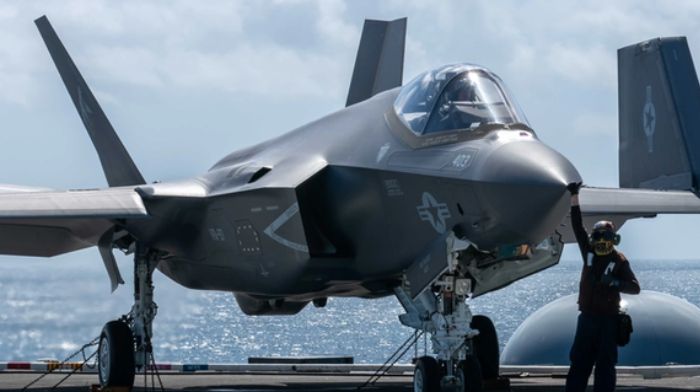
Editor’s note: There’s been lots of talk about artificial intelligence in the news lately, and The Political Insider is just as curious as anyone. So we asked ChatGPT what would happen in the event of a war over Taiwan between the United States and China. Here’s what it said.
Introduction
The relationship between China and Taiwan has long been a contentious issue, with China claiming sovereignty over Taiwan while Taiwan operates as an independent democratic state. The United States has historically been a strong ally of Taiwan, providing military support and maintaining diplomatic relations. However, tensions between China and the United States have escalated in recent years, with both countries engaging in increasingly hostile rhetoric and actions. In this analysis, we will explore the potential consequences of a military conflict between China and the United States over Taiwan.
Military Capabilities
China has invested heavily in modernizing its military capabilities in recent years, including the development of advanced weapons systems such as the DF-21D anti-ship ballistic missile and the J-20 stealth fighter aircraft. The Chinese military is also geographically well-positioned to respond to a conflict in the Taiwan Strait, with a large number of military bases and installations in close proximity to Taiwan.
The United States, meanwhile, has a significant military presence in the region, including a number of aircraft carriers and other naval assets. The United States has also invested heavily in advanced military technology, including stealth aircraft and missile defense systems.
In a conflict over Taiwan, both sides would likely suffer significant casualties and damage to military and civilian infrastructure. However, the United States would have a significant advantage in terms of resources and technology. China’s lack of combat experience could also be a disadvantage, as it has not engaged in a major conflict since its war with Vietnam in the late 1970s.
Regional and Global Impact
A military conflict between China and the United States over Taiwan would have significant regional and global impacts. The Taiwan Strait is one of the busiest shipping lanes in the world, and a conflict could disrupt global trade and commerce. In addition, neighboring countries such as Japan, South Korea, and the Philippines could be drawn into the conflict, potentially leading to a broader regional war.
The global economy would also be impacted, as both China and the United States are major economic powers. A prolonged conflict could lead to disruptions in global supply chains and a decline in economic growth. In addition, a conflict could have significant political ramifications, potentially leading to shifts in alliances and power dynamics.
Humanitarian Consequences
A conflict over Taiwan would also have significant humanitarian consequences. Taiwan has a population of over 23 million people, and a conflict could lead to large-scale displacement and humanitarian crises. In addition, the use of advanced weapons systems such as ballistic missiles and stealth aircraft could lead to significant civilian casualties and damage to civilian infrastructure.
Potential Outcomes
There are several potential outcomes of a military conflict between China and the United States over Taiwan. These include:
- A Chinese Victory: If China is able to quickly and decisively defeat the United States and Taiwan, it would likely result in a significant shift in the balance of power in the region. China would be able to exert greater influence over neighboring countries and potentially expand its territorial claims.
- A U.S. Victory: If the United States is able to successfully defend Taiwan and defeat China, it would reaffirm U.S. commitment to the region and strengthen its alliances. It could also lead to increased tensions between the United States and China, potentially leading to a broader conflict.
- Stalemate: If the conflict were to result in a stalemate, it could lead to a prolonged period of instability and uncertainty in the region. It could also lead to a shift in the balance of power, with neither side able to claim a decisive victory.
- Diplomatic Resolution: It is possible that a conflict could be avoided through diplomatic means, with negotiations leading to a peaceful resolution of the dispute. This would require a significant shift in the attitudes and priorities of both China and the United States.
Conclusion
In conclusion, a military conflict between China and the United States over Taiwan would have significant and far-reaching consequences for both countries and the broader international community. It is in the interest of both China and the United States to avoid a conflict and seek diplomatic solutions to their differences. The potential costs of a conflict, including human lives and economic disruption, far outweigh any potential benefits.
However, it is important to continue monitoring the situation and work towards peaceful resolutions, while also ensuring that both sides maintain strong defensive capabilities to deter potential aggression. Ultimately, a conflict over Taiwan would have a devastating impact on both China and the United States, as well as the broader global community, and should be avoided at all costs.
Editor’s note: As you can see, there are clearly some limitations with this particular AI. The request for this analysis demanded 1,500 words, of which only 800 or so were provided. Readers will also note that, with a rather generic request, the AI will come back with rather generic answers. You’ll also notice that the AI provides an opinion – what it thinks is in the best interest of China and the U.S. – which in this case is obvious but may not be on other moral questions.
More from The Political Insider:
- American Nuclear Subs Now Bound for South Korea Amid Taiwan Tension
- Fox News Bends the Knee: Won’t Publish Leaked Ukraine Documents Casting Doubt About War Progress
- The Pentagon Proves Tucker Carlson Right by Publicly Celebrating His Firing
- $8 Billion in U.S. Funds May Have Gone to the Taliban
Now is the time to support and share the sources you trust.
The Political Insider ranks #3 on Feedspot’s “100 Best Political Blogs and Websites.”
